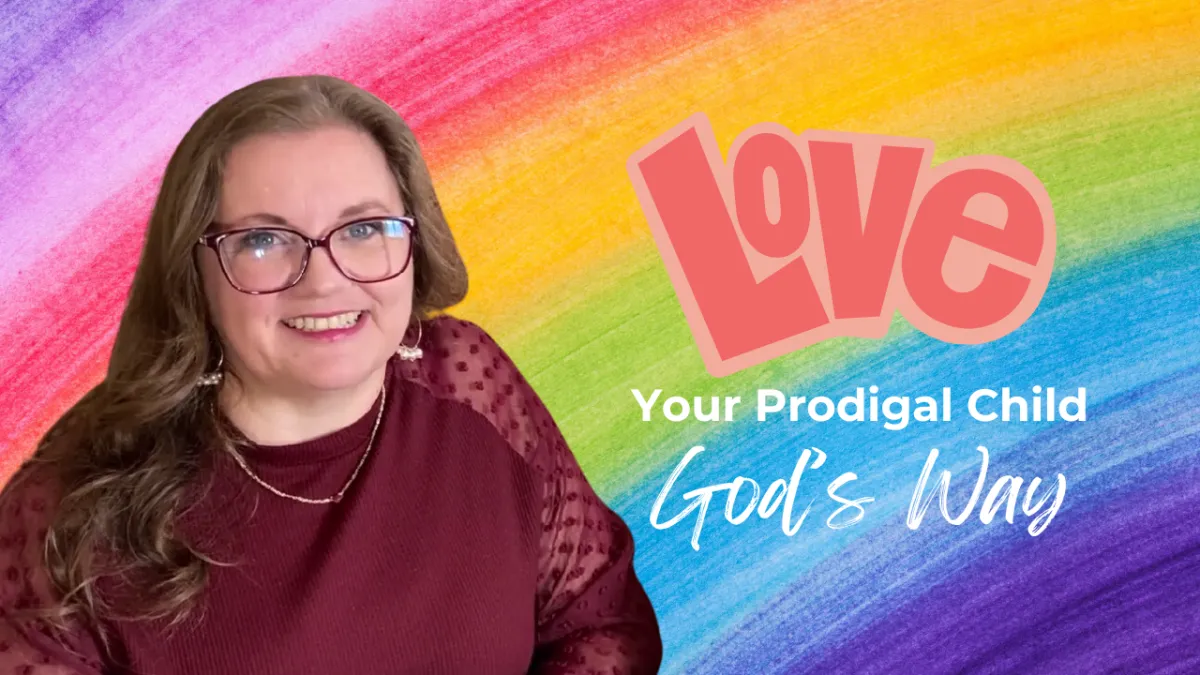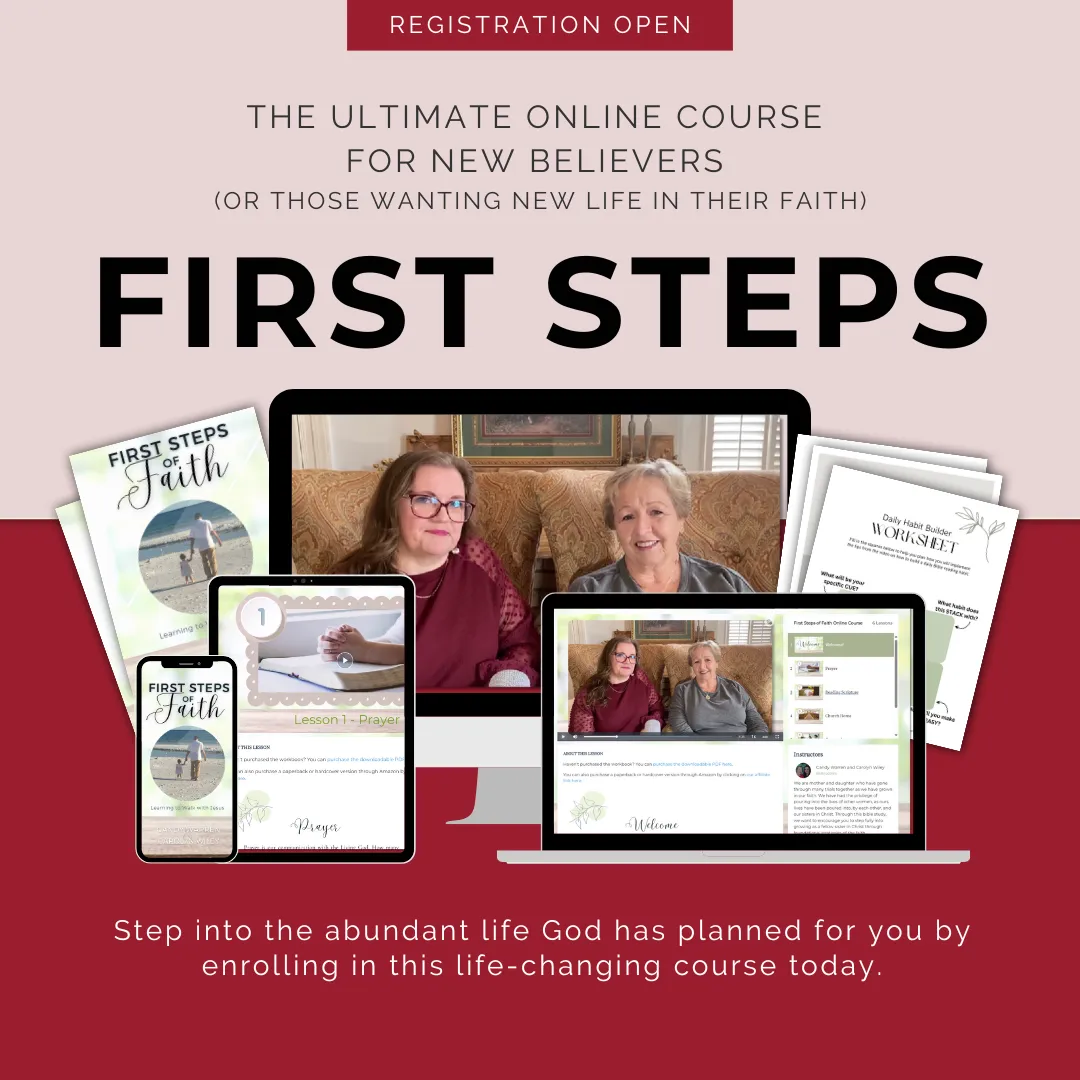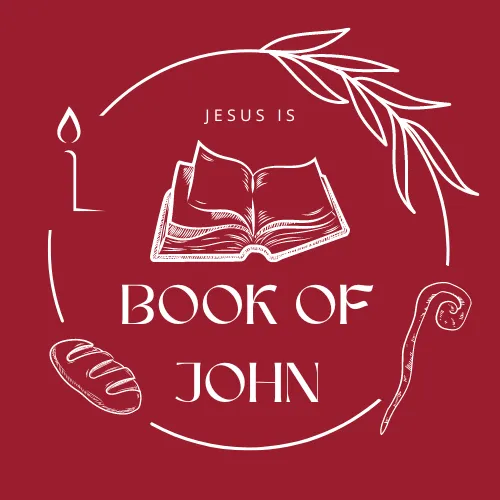
Where women grow under the shelter of the Almighty.
What is The Ruby Tent?
😇Do you crave meaningful connections with other Christian women?
🤗Are you seeking a supportive community where you can grow spiritually and find encouragement in your faith journey?
📖Do you want access to exclusive resources and events designed to uplift and empower you?
If you answered 'yes' to any of these questions, then you belong in The Ruby Tent!
Click below to start your journey with us.
The Ruby Tent is an online learning community for Christian women. We have an interactive online discussion forum, weekly emails, and discounts to our online Bible Studies and books.
Are you a momma heartbroken over your child's rejection of God?
The Ruby Tent was born out of my journey back to faith. I felt God leading me to share my story of redemption from homosexuality. My mom and I faced many struggles during my time of rebellion, but through God’s grace, we learned to heal and overcome our flesh to love each other. This powerful transformation led me back to God, and now we’re using our story to support other mothers whose children have turned away from their childhood faith.
Our signature course, “Love God’s Way,” is designed to bring healing and hope to heartbroken mothers by demonstrating practical ways God calls us to love those who disagree with us, even if they are our adult children. Leading this course live was such a full circle moment for us, as we poured into other moms the lessons we learned, hoping they might avoid the depth of heartache we experienced.
Join us in this course, and experience that hope for yourself!

Have you recently trusted Jesus as your Lord and Savior?
We would love to know!
We also have a small gift for you.

Wondering what steps to take next?
Does your faith need new life?
Have you accepted Jesus as your Savior, but aren’t sure what comes next? Should you start going to church, reading your Bible, praying? How do you even do any of that?
Sister - I got you!
Let me show you the first steps you need to take as you begin your walk with Jesus. Allow me the honor of walking with you and pouring into you as you discover the aspects of faith that will build a solid foundation. Jesus said in Matthew 7:24-27 (NIV), “Therefore everyone who hears these words of mine and puts them into practice is like a wise man who built his house on the rock. The rain came down, the streams rose, and the winds blew and beat against that house; yet it did not fall, because it had its foundation on the rock. But everyone who hears these words of mine and does not put them into practice is like a foolish man who built his house on sand. The rain came down, the streams rose, and the winds blew and beat against that house, and it fell with a great crash.”
Following Jesus is the way to build your life and your faith on that solid foundation. The foundation that will help you weather all of life’s storms.
If you want that strong foundation, then you need this Bible study! Join me for this 4-week FREE course on how to build your life on that foundation by following Jesus.
FREE Online Bible Study


Read-a-long!
Join us in reading the
Book of John!
You will receive a daily email with the chapter to read for the day, along with a Bible Study using our T.E.N.T. format. You can also join the conversation in a private Facebook group.
This course is currently FREE, so sign up TODAY!
Want to be a
Proverbs 31 Woman?
Did you know that she was not who you were talk she was? She was a businesswoman and a leader! But if you truly want to know how to lead like the Proverbs 31 woman, you need to understand the wisdom of Proverbs.
In this 31-day study, we are walking through the Book of Proverbs, one chapter a day. Digging deep and learning to walk in wisdom.


Read through the
Bible in a Year!
You will receive a daily email with the chapters to read for the day, along with short devotional to go with those chapters. You can also join the conversation in The Ruby Tent community chat.
FREE DOWNLOAD
Headline that hooks people in, gets them excited and makes them want to sign up.

What do we offer at The Ruby Tent?
Online Courses
Printed Bible Studies
Community
We offer online courses with downloadable resources and membership in community with other sisters in Christ.
We offer traditionally printed Bible studies and devotionals, perfect for individual study or small group study.
New Bible Study
Coming Soon!
ARTICLES AND STORIES

How do you read the Bible?
How do you read the Bible?
In our walk with Jesus, understanding and reading the Bible is essential for spiritual growth, after all, learning about Jesus is one key element to growing more like Him.
However, whether you're a new believer or have been walking with Jesus for years, diving into God's Word can sometimes feel overwhelming. But fear not, as today, we're breaking down the essentials to help you get started and grow in your Bible reading habit.
The Bible, with its rich history and profound wisdom, is more than just a book. It is the inspired Word of God, a guide for life, and a source of comfort and hope. It provides answers to our deepest questions and helps us understand God's character, His promises, and His plan for humanity. However, with its 66 books, multiple authors, and various genres, it can be challenging to know where to begin or how to approach reading it.
Many new believers feel daunted by the size and complexity of the Bible. Questions like "Do I start at Genesis and read straight through?" or "How do I choose the right translation?" are common. The good news is that there is no single right way to start reading the Bible. What's important is to find a method that works for you and to approach it with an open heart and a willingness to learn.
In this lesson, we will explore why reading the Bible is crucial for your spiritual journey. We'll discuss the different parts of the Bible, various translations available, and practical tips to make Bible reading a daily habit. Whether you prefer to start with the Gospels, dive into the Psalms, or explore the letters of Paul, there's a place for you to begin that suits your current stage of faith.
We'll also address common challenges and provide strategies to overcome them. From understanding difficult passages to making time for daily reading, we'll equip you with tools and tips to deepen your relationship with God through His Word. By the end of this lesson, you will have a clearer understanding of how to approach the Bible and make it an integral part of your daily life.
Join us as we uncover the simplicity and joy of reading Scripture, making it a part of your daily routine. Let's embark on this journey together, discovering the treasures of the Bible and growing closer to God with each step.

Welcome to
First Steps of Faith: Learning to walk with Jesus
online course
In our first video in the course, we looked at an overview of the course and what you can expect. If you missed that video, you can watch it here.
Our first lesson was on the foundational practice of prayer - talking to God. You can catch up with us by viewing that lesson here.
👉 If you would like to sign up for the full course, delivered to your inbox, you can sign up for it here. https://therubytent.com/firststeps-course
Here’s what you can expect:
Weekly emails with video lessons for each aspect of the faith that we will discuss.
Regular check-ins throughout the week to touch base with you and see how implementing that building block is going.
Private Facebook group to discuss what you are learning.
Want to dig even deeper? You can purchase our Companion Devotional with 5 daily devotionals for each of the building blocks of faith. First Steps of Faith Companion Devotional Kit (therubytent.com)
This devotional uses our T.E.N.T.™ system to help you learn even more about each aspect of faith and to apply to your life. Through Teaching, Enrichment, Nurturing, and Thankfulness, you go from learning about these first steps, to actually taking them.
Won’t you join us? https://therubytent.com/firststeps-course
Ok, let’s dive in and talk about reading the Bible.
With every lesson, we begin with the “why?” We are not about doing things that are pointless here in The Ruby Tent. We are moms and businesswomen, so we have too much on our plates to worry about things that are not essential. So why is reading the Bible essential for a believer?
Why should we read the Bible?
There are many reasons for why we should read the Bible, but to me, the most important reason is that it is God’s Inspired Word. If the person we loved most in the world wrote us a letter, we would read it. In fact, we would read it more than once, repeatedly. We would have parts that we know by heart. That is the same with God’s love letter to us - His Word. It is meant to help us know Him, and by knowing Him, love Him because He first loved us.
Let’s look at several other reasons for reading the Bible. Let's look at just five.
1. It's God's Inspired Word
The Bible is not just a historical document or a collection of moral teachings; it is the inspired Word of God. As 2 Timothy 3:16-17 states, "All Scripture is given by inspiration of God, and is profitable for doctrine, for reproof, for correction, for instruction in righteousness, that the man of God may be perfect, thoroughly furnished unto all good works." This means that the Bible is divinely inspired and is a vital tool for teaching, correcting, and guiding us in our spiritual journey. If we truly want to grow, then reading the Bible is how we will do it.
2. To Know God Better
James Meritt beautifully puts it, "The primary purpose of reading the Bible is not to know the Bible but to know God." Through Scripture, we learn about God's character, His promises, and His will for our lives. It reveals His nature as loving, just, merciful, and faithful. By reading the Bible, we deepen our relationship with Him and grow in our understanding of His heart. Don’t you long to know your Father just as He knows us?
3. Guidance for Daily Living
The Bible provides practical guidance for every aspect of our lives. From relationships and work to dealing with challenges and making decisions, Scripture offers timeless wisdom and principles that help us navigate life's complexities. Psalm 119:105 says, "Your word is a lamp to my feet and a light to my path," illustrating how God's Word illuminates our path and directs our steps. I often hear, “the answer to every question we have is in the Bible.” And that is true, but if we haven’t read it, we will not realize just how true that statement is.
4. Spiritual Growth and Maturity
Engaging with the Bible helps us grow spiritually and mature in our faith. Hebrews 5:12-14 compares spiritual growth to moving from milk to solid food, indicating that deeper understanding and application of Scripture lead to maturity. Regular Bible reading transforms our minds and hearts, aligning us more closely with God's will. The more we become like Jesus, the more we will understand and we able to share with others.
5. Equip for Good Works
The Bible equips us for every good work God calls us to do. Ephesians 2:10 reminds us, "For we are God's handiwork, created in Christ Jesus to do good works, which God prepared in advance for us to do." Isn’t it amazing that God created these works for us in advance! By studying the Bible, we are prepared and empowered to serve others and fulfill our purpose in God's kingdom.
How is the Bible Structured?
Now that we've explored the profound reasons for immersing ourselves in the Bible—its role as the inspired Word of God, a guide for daily living, and a source of spiritual growth—let's delve into understanding the Bible's structure.
Recognizing how the Bible is organized can enhance our reading experience, making it easier to navigate its pages and comprehend its unified message. By familiarizing ourselves with the distinct sections, genres, and historical contexts of the Bible, we can approach our study with greater confidence and clarity, uncovering the depths of wisdom and revelation that lie within its sacred texts.
The Bible is a unique and complex book, composed of various types of literature written by multiple authors over many centuries. Understanding its structure can help us navigate its contents more effectively and appreciate its unified message. Here’s a detailed look at the Bible’s composition:
A Collection of Books
The Bible is not a single book but a collection of 66 smaller books. These books are divided into two main sections: the Old Testament and the New Testament. Each testament has its unique focus and themes, yet both are integral to the complete message of the Bible.
The Old Testament
The Old Testament consists of 39 books and can be further divided into several categories based on their content and purpose:
The Pentateuch (Torah or Law): The first five books—Genesis, Exodus, Leviticus, Numbers, and Deuteronomy—are attributed to Moses. These books cover the creation of the world, the early history of humanity, the story of Israel's ancestors, and the giving of the Law.
Historical Books: These books—Joshua, Judges, Ruth, 1 & 2 Samuel, 1 & 2 Kings, 1 & 2 Chronicles, Ezra, Nehemiah, and Esther—detail the history of the Israelites, from their conquest of Canaan to their exile and return.
Wisdom Literature: Books like Job, Psalms, Proverbs, Ecclesiastes, and Song of Solomon offer poetic and philosophical reflections on life, faith, and human experience.
Prophets: The prophetic books are divided into Major Prophets (Isaiah, Jeremiah, Lamentations, Ezekiel, and Daniel) and Minor Prophets (Hosea through Malachi). These books contain the messages of God's prophets, who called Israel to repentance and foretold future events.
The New Testament
The New Testament consists of 27 books and can also be categorized based on their content and purpose:
Gospels: The four Gospels—Matthew, Mark, Luke, and John—provide accounts of the life, teachings, death, and resurrection of Jesus Christ.
Acts of the Apostles: This book, commonly known as Acts, details the early history of the Christian church and the spread of the Gospel after Jesus' ascension.
Epistles (Letters): These are letters written by apostles to various churches and individuals. They include Pauline Epistles (Romans through Philemon) and General Epistles (Hebrews through Jude). These letters address theological issues, provide guidance for Christian living, and offer encouragement.
Apocalyptic Literature: The Book of Revelation uses symbolic language to describe the ultimate victory of Christ and the end of the world.
The Canon of Scripture
The term "canon" refers to the collection of books that are considered authoritative and inspired. The canon of the Bible was established based on several criteria, including apostolic authorship, consistency with accepted doctrine, and widespread use in worship and teaching.
Old Testament Canon: The Hebrew Bible (Tanakh) aligns closely with the Christian Old Testament, though the order of the books may differ. The Old Testament books were recognized as authoritative by Jewish religious leaders and later affirmed by early Christians.
New Testament Canon: The books of the New Testament were written by apostles or close associates of the apostles. The early church recognized these writings as inspired and authoritative, and by the fourth century, the current 27-book New Testament canon was widely accepted.
Languages of the Bible
The Bible was originally written in three languages:
Hebrew: Most of the Old Testament was written in Hebrew, the ancient language of Israel.
Aramaic: Portions of the Old Testament (primarily in Daniel and Ezra) were written in Aramaic, a common language of the Near East during the time of the Babylonian and Persian empires.
Greek: The entire New Testament was written in Koine Greek, the common language of the Eastern Mediterranean region during the time of the early church.
Bible Translations
To make the Bible accessible to people around the world, it has been translated into numerous languages. There are three main types of Bible translations:
Word-for-Word (Literal) Translations: These translations, like the King James Version (KJV) and the English Standard Version (ESV), aim to be as close to the original text as possible. They translate each word directly from the original languages.
Thought-for-Thought (Dynamic Equivalence) Translations: These translations, like the New International Version (NIV), focus on conveying the meaning of phrases rather than individual words. They aim to make the text more readable and understandable in contemporary language.
Paraphrase Translations: These versions, like The Message (MSG), rephrase the text in modern, conversational language. They are not direct translations but aim to make the message of the Bible more accessible and relatable.
Thematic Unity
Despite being written over a span of 1,600 years by more than 40 different authors, the Bible maintains a remarkable thematic unity. The central theme of the Bible is God's plan of redemption through Jesus Christ. This unifying message is woven throughout the entire Bible, from Genesis to Revelation.
Understanding the structure of the Bible helps us appreciate its richness and depth. It equips us to study it more effectively and to see the coherent story of God's love and salvation plan for humanity. By knowing how the Bible is organized, we can better navigate its pages and apply its truths to our lives.
How do I begin to read the Bible?
Embarking on your Bible reading journey can be both exciting and a bit daunting, especially if you're not sure where to begin. Here are some practical steps to help you get started:
Pick a Time and Location - Finding a consistent time and place for your Bible reading is crucial for developing a routine. Choose a time of day when you can be quiet and undisturbed. For some, this might be early in the morning before the day's activities begin. For others, it could be during a lunch break or in the evening before bed. The key is to find a time that works best for you and stick to it.
Your location should be a comfortable and distraction-free environment. Whether it's a cozy chair in your living room, a quiet corner of your bedroom, or a spot in your garden, make sure it's a place where you can focus and feel at peace.
Decide What to Read - With 66 books to choose from, deciding where to start can be overwhelming. Here are a few suggestions:
The Gospels (Matthew, Mark, Luke, and John): These books provide a detailed account of Jesus' life, teachings, death, and resurrection. They are a great starting point for understanding the core of Christian faith.
Psalms: Known for their poetic and comforting nature, the Psalms are perfect for finding peace and inspiration.
Proverbs: This book offers practical wisdom and guidance for everyday life. If you want to read through this book, one chapter a day for 31 days (one month) works great! You can read with us in our Wise Woman Challenge!
Genesis: As the song says, "Let's start at the very beginning. A very good place to start." The first book of the Bible, Genesis, covers the creation of the world, the early history of humanity, and the beginnings of the nation of Israel.
Remember, there is no right or wrong place to start. Choose a book that interests you or one that you feel drawn to.
Pray Before You Begin - Before you start reading, take a moment to pray. Ask God to open your heart and mind, to teach you through His Word, and to help you understand and apply what you read. Praying before you read invites the Holy Spirit to guide your study and illuminate the scriptures.
Journal Your Thoughts - As you read, keep a journal nearby to jot down your thoughts, questions, and any insights you gain. Writing down what stands out to you helps reinforce your understanding and makes it easier to reflect on what you've learned. Journaling also allows you to track your spiritual growth over time.
Making Bible Reading a Habit
Developing a new habit takes time and intentionality, but with the right approach, reading the Bible can become a natural and enjoyable part of your daily routine. Here are some tips to help you establish a lasting habit:
1. Use a Cue: In his book "Atomic Habits," James Clear emphasizes the importance of cues in forming new habits. A cue is a specific trigger that reminds you to perform your habit. For Bible reading, your cue should be something you already do regularly. For example, you might decide to read the Bible right after you have your morning coffee or as soon as you get home from work.
2. Make it Enjoyable: Choose a Bible version and study method that you enjoy. If you love using colorful pens and highlighters, incorporate them into your study time. If you prefer a more straightforward approach, that's perfectly fine too. The goal is to make your Bible reading time something you look forward to rather than a chore.
3. Set Yourself Up for Success: Prepare your reading space in advance. Have your Bible, journal, pens, and any other materials you use ready and accessible. Keeping everything in one place makes it easier to dive into your study without having to search for supplies.
4. Start Small: If you're new to regular Bible reading, start with manageable goals. You might begin with a single chapter a day or even a few verses. As you become more comfortable, you can gradually increase the amount of time you spend reading and studying.
5. Stay Consistent: Consistency is key when forming a new habit. Try to read the Bible at the same time and place every day. If you miss a day, don't be discouraged. Simply start again the next day and keep going. Your goal with consistency is not perfection, but simply doing it more often than you don't.
6. Seek Accountability: Sharing your Bible reading goals with a friend or joining a Bible study group can provide accountability and encouragement. Discussing what you've read with others can also deepen your understanding and make the experience more enriching. This is where The Ruby Tent can help you! With so many Bible reading options available to our members, and more coming all the time, you can find one to join with built in accountability!
7. Celebrate Progress: Acknowledge your efforts and celebrate your progress, no matter how small. Recognizing your growth can motivate you to continue and make Bible reading a lasting habit.
By incorporating these strategies, you can establish a meaningful and consistent Bible reading routine. Remember, the goal is to grow closer to God and deepen your understanding of His Word. Take it one step at a time, and enjoy the journey of discovering the treasures within the Bible.
👉 Need help creating a Bible Reading Habit? Check out this helpful resource!

From Bible Reading to Bible Study: The Five Key Questions
Studying the Bible can be an enriching experience, especially when you approach it with the right tools and questions. To deepen your understanding and make your study more meaningful, consider asking the following five key questions as you read through the scriptures. These questions can help you uncover the context, meaning, and application of the passages you study.
1. Who?
Who wrote the book? Identifying the author can provide insights into the text's perspective and purpose. For example, knowing that Paul wrote many of the New Testament letters to pastors or specific churches helps us understand their message.
To whom was it written? Understanding the original audience can illuminate why certain issues were addressed. For instance, Paul's letters to the Corinthians addressed specific problems in the Corinthian church, which can help us understand the cultural problems he was addressing.
2. What?
What is the main message or theme? Each book and passage of the Bible has a central message or theme. Identifying this can help you grasp the overall purpose of the text. For example, the main theme of Romans is the righteousness of God and how we are justified by faith.
What are the key events or teachings? Pinpointing significant events, teachings, or parables can help you understand the core lessons of the passage. In the Gospels, for instance, key events include Jesus’ miracles, parables, and interactions with various people.
What does this tell me about God - His character and His plan for redemption through Jesus? That is the whole purpose of the Bible, after all. So read each passage with this question in mind.
3. Where?
Where did the events take place? Knowing the geographical context can add depth to your understanding. For example, understanding that Jesus performed many of His miracles around the Sea of Galilee can help you visualize His ministry and the impact on the local population.
Where was the author when they wrote it? The author's location can also influence their writing. Paul wrote several of his letters from prison, which underscores his perseverance and faith despite his circumstances.
4. When?
When was it written? Placing the text within its historical timeline can help you understand its context and relevance. For instance, knowing that Revelation was written during a time of Roman persecution can provide insights into its apocalyptic themes.
When do the events occur within the biblical narrative? Understanding whether events happened before or after significant milestones, such as the Exodus or the birth of Jesus, helps place the text in its broader biblical context.
5. Why?
Why was it written? Determining the purpose behind the text can help you understand its relevance and application. For example, the Gospel of John was written so that readers might believe that Jesus is the Christ and have life in His name (John 20:31).
Why does this passage matter to me today? Reflecting on the personal application of the text helps bridge the gap between ancient writings and modern life. Ask how the passage speaks to your current circumstances, challenges, or spiritual growth.
Practical Application of the Five Questions
To illustrate how these questions can enhance your Bible study, let's apply them to a familiar passage: John 3:16.
Who wrote the book? The Apostle John, one of Jesus’ closest disciples.
To whom was it written? John's Gospel was written to a broad audience, including both Jews and Gentiles, to convey the message of Jesus as the Son of God.
What is the main message or theme? John 3:16 encapsulates the Gospel message: God's love for the world, the giving of His Son, and the promise of eternal life to believers.
Where did the events take place? The conversation between Jesus and Nicodemus occurred in Jerusalem.
Where was the author when they wrote it? John likely wrote his Gospel many years after the events took place, possibly while he was in Ephesus.
When was it written? The Gospel of John was likely written between 85-95 AD. (How would you know this? Through a google search or a reputable Bible reference. More about those in a minute.)
When do the events occur within the biblical narrative? This conversation happens early in Jesus' ministry.
Why was it written? To present Jesus as the Messiah and Son of God, and to offer eternal life to those who believe in Him.
Why does this passage matter to me today? John 3:16 is a foundational verse for understanding the core of Christian faith: God's love and the gift of salvation through Jesus.
Utilizing Resources
While focusing on scripture itself is crucial, there are additional resources that can aid in answering these questions:
Bible Dictionaries and Handbooks: These can provide background information on authors, historical context, and key themes.
Commentaries: Scholarly works that offer detailed explanations and interpretations of biblical texts.
Concordances: These help you find where specific words or themes appear throughout the Bible, aiding in deeper study.
Study Bibles: These include notes and references that can answer many of the who, what, where, when, and why questions. I personally use a Kay Arthur Study Bible that I love!
Applying the Five Questions to Your Study
Asking these five questions as you read the Bible can transform your study from a passive reading exercise into an active exploration of God’s Word. This approach helps you engage more deeply with the text, uncover its rich layers of meaning, and apply its truths to your life. Whether you're studying alone or in a group, these questions can guide your discussion and reflection, leading to a more profound understanding of Scripture and a closer walk with God.
👉 We have created a beautiful handout for you to guide you in asking these 5 questions. You can download it HERE.

What works best for you? Join us in The Ruby Tent on your favorite social media (@therubytent), and let us know!
Want to continue your study with the next video in the series? Watch our lesson on finding a church home HERE.
Would you love these lessons delivered to your inbox? Sign up for our FREE course!
📌Come join me in The Ruby Tent - an online community for women just like you looking for sisterhood and connection as they grow in their faith. We are a safe place to ask all those crazy questions you have as well. https://therubytent.com/signup
🎁If you are new to the faith, we have a gift for you! https://therubytent.com/trustjesus
📖 Want to read the Bible with me? Come join me in the Bible in a Year Challenge! You will get an email each morning with the chapters to read that day and a short devotional to go along with them. Let’s go! https://therubytent.com/opt-in-page-bibleinayear
#jesus #faithcommunity #newbeliever #biblestudy #howtoreadthebible #grace #scripture #amen #jesussaves #worship #quiettime #faith #Bible #gospel #Jesuslovesyou #firststepsoffaith
Did you enjoy this content, or find it useful? Please share it on your favorite social media or with someone else who will enjoy this content.
The Ruby Tent is reader-supported. When you buy through links on our site, we may earn an affiliate commission. As an Amazon Associate, we earn from qualifying purchases at no additional cost to you.
The Ruby Tent is an imprint of Rose and Pearl Publishing, LLC.
As such, The Ruby Tent is governed by the Privacy Policy and Terms & Conditions of Rose and Pearl Publishing, LLC.
© Copyright 2024 Rose and Pearl Publishing, LLC, All rights reserved. - Privacy Policy - Terms & Conditions
This page contains affiliate links. If you choose to purchase after clicking a link, we may receive a commission at no extra cost to you.
You can learn more by reading our affiliate disclosure here.
DISCLAIMER: The information provided by Rose and Pearl Publishing LLC and its trading names ("The Ruby Tent"), here as "we," "us," "our) on https://roseandpearl.net and https://therubytent.com (the "Site" or "Sites") is for informational purposes only. All information on the Sites is provided in good faith; however, we make no representation or warranty of any kind, express or implied, regarding the accuracy, adequacy, validity, reliability, availability, or completeness of any information on the Sites. Read the full Disclaimer here.

